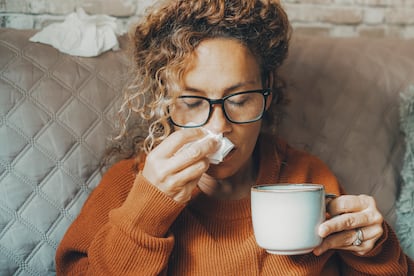The home remedies that provide some relief for cold and flu symptoms
Is there any truth in the claims about zinc, ginger and turmeric? Some of these could have unwanted side effects, especially combined with prescription drugs

There is no definitive cure for the flu or a cold. As the saying goes, flu lasts seven days without treatment and one week with treatment. But there are a series of recommendations –mostly based on traditional remedies – that can slightly shorten the period of illness and relieve the symptoms.
It seems that vitamin C, as well as echinacea infusions, are one such remedy, although they may curtail the illness by as little as day. Some people swear by zinc, but this is controversial. While it is true that zinc supplements can shorten the period of illness, they can also have side effects. Any person taking a prescription drug for another illness should avoid zinc supplements as they may produce other unwanted conditions such as diarrhea.
Other remedies that often get mentioned include ginger and turmeric. The problem here is that we do not know how much to take for these to be effective – the amount we add to food is insignificant, and there are no studies indicating the amount needed for them to work. You can add a bigger pinch of ginger or turmeric to your dishes, but don’t count on it being a panacea.
What has been seen to relieve discomfort is hydration. Drink water, herbal teas, orange juice, hot broth and lemon juice with honey and water. Remember, it is important for these fluids not to come straight from the fridge: a lukewarm beverage is better.
Among the most disagreeable flu symptoms are muscle pain, headache and fever, described by doctors as “general malaise.” Then there are other symptoms that may or may not appear, such as a sore throat, and a runny or blocked nose.
Sucking on candy can help a sore throat, whether the traditional mint flavor, propolis or honey and lemon. Vapours using eucalyptus are also useful because they reduce the sensation of being stuffed up. It is also helpful to inhale steam from warm saline water. Humidifiers may also help, though they need the excess water removed on a daily basis and they also need to be disinfected daily to avoid them becoming a breeding ground for bacteria.
When it comes to pain reduction, the only thing that works is an anti-inflammatory, whether this be aspirin or ibuprofen. Meanwhile, though not a home remedy, the flu drugs sold in pharmacies can relieve symptoms, though they don’t pretend to be a cure either.
In short, symptoms can be alleviated but only to a certain extent. You basically just have to put up with flus and colds while getting as much rest as you can and remaining hydrated.
María Elisa Calle Purón is a medical specialist in epidemiology, preventive medicine and public health.
Tu suscripción se está usando en otro dispositivo
¿Quieres añadir otro usuario a tu suscripción?
Si continúas leyendo en este dispositivo, no se podrá leer en el otro.
FlechaTu suscripción se está usando en otro dispositivo y solo puedes acceder a EL PAÍS desde un dispositivo a la vez.
Si quieres compartir tu cuenta, cambia tu suscripción a la modalidad Premium, así podrás añadir otro usuario. Cada uno accederá con su propia cuenta de email, lo que os permitirá personalizar vuestra experiencia en EL PAÍS.
¿Tienes una suscripción de empresa? Accede aquí para contratar más cuentas.
En el caso de no saber quién está usando tu cuenta, te recomendamos cambiar tu contraseña aquí.
Si decides continuar compartiendo tu cuenta, este mensaje se mostrará en tu dispositivo y en el de la otra persona que está usando tu cuenta de forma indefinida, afectando a tu experiencia de lectura. Puedes consultar aquí los términos y condiciones de la suscripción digital.








































